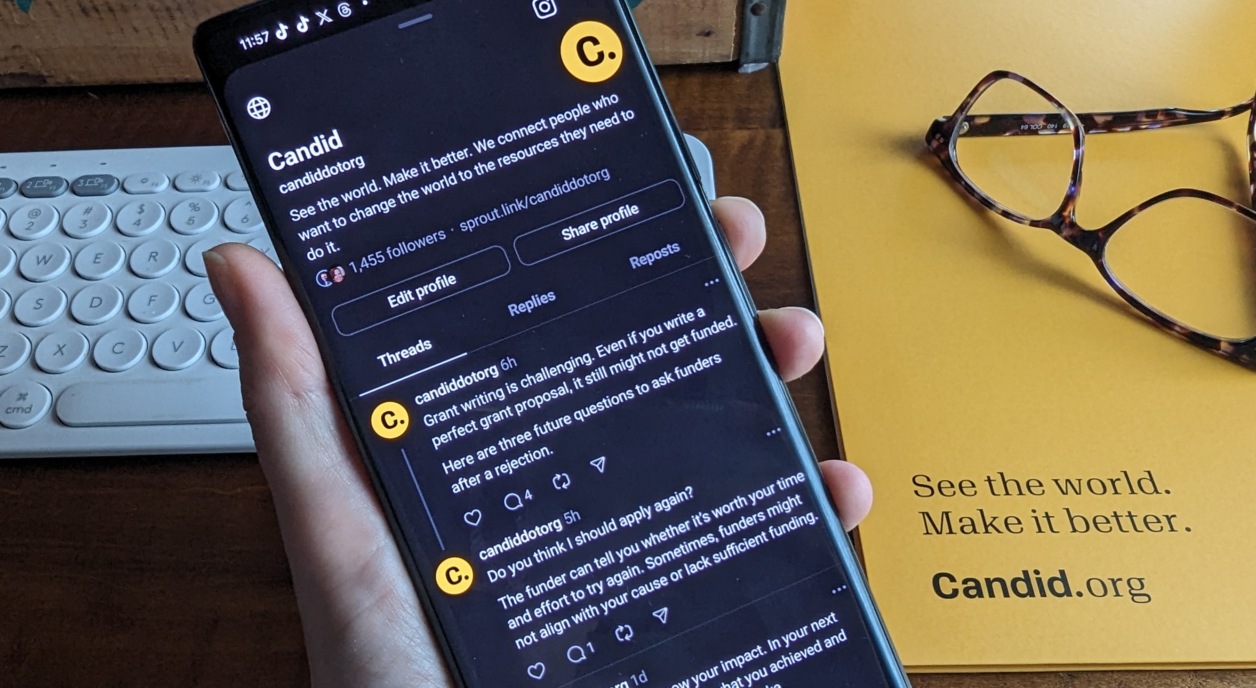How to secure corporate sponsors for your fundraising event

As a nonprofit professional, you understand how much time, resources, and planning goes into running a successful fundraising event. Between reserving a space, booking catering, lining up items for your charity auction, and more, costs can quickly add up for your organization. This is where corporate sponsors can help.
Corporate sponsorship is a mutually beneficial relationship wherein a company offers direct financial support, in-kind donations, or skilled volunteer services to support a nonprofit in meeting its fundraising event goals. In return, the nonprofit will provide advertising and publicity opportunities to help the company reach and engage their event’s audience.
Successfully securing corporate sponsors for your fundraising event can not only give your budget and staff’s bandwidth a boost. It also promises to benefit your nonprofit’s fundraising event by:
- Opening up and attracting new audiences to attend your gathering.
- Increasing the overall visibility of your event through co-promotion.
- Lending extra credibility to your event to help you draw in donations.
Companies also stand to reap the rewards of sponsoring your nonprofit’s event. Companies can benefit from sponsoring your event by:
- Boosting their brand awareness and credibility in your community.
- Building interest in their products and services with your attendees.
- Bolstering their public image by visibly supporting your cause.
Here are four essential tips to help you secure and establish effective corporate sponsorships for your nonprofit’s next fundraising event.
1. Identify potential corporate sponsors
As corporate social responsibility (CSR) programs and cause-related marketing increase in popularity, there are plenty of companies that are eager to partner with nonprofits and support pivotal causes. But remember, corporate sponsorships should benefit both parties involved.
As such, your nonprofit will first need to showcase itself as a viable partner that can provide meaningful value and marketing outcomes to corporate sponsors in exchange for their support. To identify prospective companies that may stand to benefit from sponsoring your fundraising event, ask yourself the following questions:
- What companies are in our local community that align with our nonprofit’s values and fundraising event audience?
- What companies have a customer base that cares about charitable causes and our mission area in particular?
- What companies have an existing corporate social responsibility program and have supported nonprofits’ events similar to ours in the past?
- What companies may have products or services that may be of interest to our fundraising event’s audience?
For instance, let’s say your nonprofit’s mission is focused on advancing science, technology, engineering, and mathematics (STEM) education in your community. As such, your fundraising event typically attracts experts in this same field. A technology company whose target customers are STEM professionals may make a good prospective sponsor to approach. Here’s why: By publicly supporting your fundraising event, they can build awareness of their products with your attendees–all while showcasing their commitment to advancing social good in the space.
Once you’ve created a list of potential companies to approach, it helps to understand which people at those organizations you should seek to connect with. Because sponsoring fundraising events represent promotional opportunities for these companies, it’s good to start by reaching out to employees in marketing, brand, CSR, and partnerships roles.
Remember to tap into the power of your own network and those of your staff, volunteers, board members, and loyal donors to aid with your search to find potential corporations to sponsor your fundraising event. These connections may be able to help facilitate a warm introduction with key contacts at potential companies.
If you don’t have network connections at your list of target companies, don’t worry. The next step to success remains the same: propose the benefits that supporting your fundraising event will bring for prospective corporate sponsors.
2. Reach out with a personalized sponsorship letter
Now you’ll need to deliver a compelling pitch that’s personalized to each recipient. This means it pays to do your homework on these companies’ goals, corporate values, customer bases, board members, current philanthropic initiatives, and more.
This information can help you pinpoint the distinct value that sponsoring your fundraising event will provide. To tailor your sponsorship letter to potential partners, incorporate these elements:
- An introduction to your nonprofit and fundraising event. Introduce yourself, your nonprofit’s mission, programs, and the real-world outcomes your organization drives. Share the link to your Candid nonprofit profile for added credibility, and if your organization has a Candid Seal of Transparency, consider highlighting that as well. Next, you’ll also want to explain the type of fundraising event you are hosting, its goals, and your target demographic, plus attendance estimates.
- A summary of your fundraising event needs. Clearly explain the specific type of support you’re looking for and how this will help your organization further its mission. Be specific about how the company can contribute to your fundraising event’s success through direct financial support, making in-kind donations, or providing pro-bono services. Once you’ve outlined the type of support you need, explain how this will bring your nonprofit closer to hitting its fundraising goals.
- A strong case for sponsoring your event. In this section, you’ll demonstrate your knowledge of the company and outline how this potential event partnership will benefit them. Let them know in specific terms what your sponsorship offers, including the pre-, during, and post-event promotional opportunities you’ll provide. Then, be sure to help them connect the dots between the benefits and value of this publicity among your fundraising event’s audience.
3. Set expectations and develop a formal agreement
When corporate sponsors agree to support your fundraising event, the next step is developing your formal agreement. Here, you’ll clearly lay out the expectations for both your nonprofit and your corporate sponsor. That way, you can align from the start on the role that each party will play in the success of your fundraising event.
In this agreement, be sure to align on the following:
- Goals. Be sure to articulate your goals of your fundraising event’s sponsorship. This will help document your and your sponsor’s expectations for the event. It will also give you an effective framework for determining whether your event sponsorship was a success once the show is over.
- Timeline. Clearly define when and how you and your corporate sponsor co-promote your fundraising event. Additionally, be sure to list out the deliverables you’ll need to do so, such as logo files, copy for event materials, and social posts. Similarly, if your nonprofit will be marketing the company at your event, create a campaign calendar that lays out when, how, and where you will promote their brand.
- Dedicated contact. Your nonprofit and its corporate sponsors should each have a point person that is responsible for communicating any questions or updates. This will help ensure that you and your corporate supporter stay on the same page throughout the event planning process.
4. Express appreciation to partners
After your event comes to a close, as well as thanking your donors, you will also want to express gratitude for your corporate sponsor’s support. Following your event, send a thank you note to your corporate supporter that includes the following details:
- Number of event attendees
- Amount of money you raised
- How these funds will make a difference in your mission
- Any handwritten tax-related receipts for their donations or contributions
You can also publicly demonstrate your appreciation to your partner before, during, and after your event. Demonstrating sincere gratitude shows your corporate sponsor that you truly value their support, increasing the likelihood that they might sponsor your events again in the future.
With the right corporate sponsors, you’ll be able to maximize the success of your upcoming fundraising event. Ensure that you set up a mutually beneficial partnership that will help you both to reach your respective goals. By being communicative and appreciative, you can create a long-term relationship to benefit your organization for years to come.
To get a deeper dive into the world of corporate giving, be sure to check out our free trainings and resources to learn more about how to seek support from companies.







Charles122 says:
The information was really helpful. Keep up the good work.
whydonate says:
"Start Finding Sponsors For Your Nonprofit, Find out how to get sponsors for Nonprofit Organisations. 6 amazing ideas to start finding sponsors for your fundraising campaigns. - https://whydonate.com/en/blog/finding-sponsors/
"
Louis Frangos says:
This was very helpful information
Thank you